|
De Nederlandse dichter Alexis de Roode werd geboren op 8 oktober 1970 in Hulst. Zie ook mijn blog van 8 oktober 2010 en eveneens alle tags voor Alexis de Roode op dit blog.
Winterwende
Verder en verder
de stad uit,
naar de onverlichte landen
wandelt hij,
de oude buitenslaper,
tranen kwijlend in zijn baard.
In het donker moet hij zoeken
naar wat niet
tussen mensen bestaat.
Oorzaakloos
flakkert in de lege kamer
een kaars.
Tijd likt onze handen,
trouwe hond die stinkt
en ouder wordt. Daarom
moeten wij vuren branden,
en alsmaar luisteren naar Bach.
Waar de nacht wit is
en schitterend van vorst,
keert hij om
en strompelt naar de stad terug
als een koning
met sterren bestrooid.
Samen met de ochtend
nadert hij, de ijspegels
aan zijn baard half ontdooid.
Gooi het joelblok in de haard.
Vouw cirkels tot slingers
en kroon de boom
rood wit rood.
Drie vonken stijgen
in de nacht:
een voor jezelf,
een voor je familie,
een voor de wereld.
Bosrand
Op een herfst zonder geloof
ging ik naar de hoeders van gene zijde.
Het was toen oktober
en mijn haar kleurde rood.
Ik ging uit de tijd,
dat wil zeggen,
ik ging uit de wereld.
Sprak tot een omgevallen boom
en zong voor één stervend blad.
Ik zag dat het denken
een lelijk huis was:
een vierkante woondoos
die ongenadig oprees uit de polders.
Sloopkogels!
Maar had alleen een BIC M10.
Langs een slootje schrijf ik dit,
bij dalend licht,
met uitzicht op een bosrand.
Tussen de stammen,
waar de nacht al begonnen is,
fluit een vogel de aarde stil.
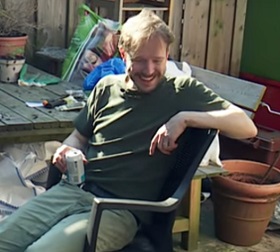
Alexis de Roode (Hulst, 8 oktober 1970)
De Nederlandse schrijver en journalist Martin van Amerongen werd geboren op 8 oktober 1941 in Amsterdam. Zie ook mijn blog van 8 oktober 2010 en eveneens alle tags voor Martin van Amerongen op dit blog.
Uit:De zwarte humor van Shakespeare
“Neem De getemde Feeks.
Het is een miraculeuze komedie. Bestudeer je hem, de Arden of de Burgersdijk op schoot, in de stoffige beschutting van je bibliotheek, kan er gegarandeerd geen lachje af, ook al ga je jezelf met een plumeau of lolaborstel te lijf op de diverse kietelgevoelige lichaamsonderdelen. De parterre - ikzelf inclusief lacht zich echter al vierenhalve eeuw tranen om het gebodene. Geloof me: De getemde Feeks is zonder enige concurrentie Shakespeares zwakste blijspel. Het is een breed uitgewalste anekdote zonder veel poëtische zeggingskracht, de hoofdfiguren zijn karikaturen, de bijfiguren zijn clichés, de structuur - met een proloog rond een beschonken ketellapper - slaat nergens op en de moraal staat dwars op de Wet Gelijke Behandeling. Maar ziet! Eenmaal op het toneel gebracht voltrekt zich onmiddellijk dat mysterieuze proces, waarin het voorhanden zijnde lood in goud wordt veranderd, en vijf bedrijven lang ben je, geërgerd maar geamuseerd, getuige van een primitieve, onsympathieke, oergeestige en meeslepende hansworstiade.
Kenmerkend is de reactie van Paola Dionisotto, die in 1967 door de Royal Shakespeare Company werd uitgenodigd om De getemde Feeks in studie te nemen. ‘Ze zeiden me, dat het een meesterlijk toneelstuk was, dat nimmer zijn effect op het publiek placht te missen. Ik nam de tekst mee naar huis en las het daar nauwkeurig door. Ik was ontzet, ik vond het niet in het minst humoristisch, in feite vond ik het door-en-door afstotelijk.’ Totdat Katharina, Petruchio, Bianca en Battista op de planken uit hun papieren isolement traden en ter plekke veranderden in wezens van vlees en bloed.
Peereboom wijst op het feit dat de tragedies en histories met grote regelmaat door humoristische passages worden veredeld. Mijn theorie gaat verder: in zijn tragedies, koningsdrama's (en zijn problem plays) is Shakespeare, anders dan in zijn blijspelen, eigenlijk op zijn grappigst. De voedster in Romeo en Julia, de redekavelende poortwachter in Macbeth, de ongelukkige bode in Antonius en Cleopatra, de dichter Cinna in Julius Caesar, de vuilbekkende dwerg Thersites in Troilus en Cressida. Is er ooit een betere proeve van zwarte humor geschreven dan Titus Andronicus? Bestaat er een geslaagder voorbeeld van boulevardtoneel dan Richard iii?"
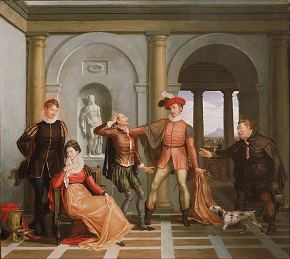
Martin van Amerongen (8 oktober 1941 – 11 mei 2002)
Scene uit Shakespeare's “The Taming of the Shrew” door Washington Allston, 1809
De Amerikaanse schrijver Benjamin Cheever werd geboren op 8 oktober 1948 in New York. Zie ook mijn blog van 8 oktober 2010 en eveneens alle tags voor Benjamin Cheever op dit blog.
Uit:The Good Nanny
“The agent had arrived a half an hour early-Andie was still in the shower-and presented Stuart with a one thousand, one hundred-page manuscript titled Gone With the Wind . (Not that Gone With the Wind .) "Random House despised it, but I think it's perfect for you," he explained.
Now Stevens was making Andie blush.
"Is Tom Hanks here?" he asked.
"I didn't invite him," said Andie.
"He would have come," said Stevens, moving his face unnaturally close to that of his hostess. "Doesn't he want good reviews?"
"It doesn't work that way," said Andie, backpedaling out of range of the spray.
"Then how does it work?" asked Stevens. "I told Loretta that he might be here."
"I judge the movie on its merits," said Andie.
"Isn't that a bit subjective?" asked Stevens.
"Yes," said Andie.
"But you don't pay for your tickets, do you?" asked Stevens.
"No," said Andie, "not usually."
"Which right away puts you in a different position than all the rest of us," said Stevens. "Loretta asked me the other day if you got free popcorn. I didn't know. Do you get free popcorn?"
"No," said Andie, "not usually."
Stevens nodded pensively. "Did you ever try and figure out how much they pay you per review?" he asked.
"No," said Andie. "I never did."
"Loretta was saying they should wire a keypad into the seats," Stevens continued. "After the movie, everybody could push a button for thumbs-up, or a different button for thumbs-down. The results could be tabulated and published. That way we'd really know what to see."
"Enough charming chitchat for now," said Stuart, inserting himself between Andie and the agent. "How about a house tour? Anybody who wants to admire the Jacuzzi," he said, "queue here." Half a dozen late arrivals responded to the invitation, and Stuart started up the stairs. "The real estate agent promised a seasonal view of the Hudson," he said. "I don't see it. Unless she was talking about the nuclear winter."

Benjamin Cheever (New York, 8 oktober 1948)
De Duitse schrijver Jakob Arjouni (pseudoniem vanJakob Bothe) werd geboren op 8 oktober 1964 in Frankfurt am Main. Zie ook mijn blog van 8 oktober 2010 en eveneens alle tags voor Jakob Arjouni op dit blog.
Uit: Mehr Bier
„Der Kaffee war dünn, und das feuchtweiche Käsebrötchen mußte seit Tagen im Kühlschrank gele-gen haben. Ich riß es in Brocken und spülte mit Kaffee nach. Die klebrige Theke roch nach Bier. Zwei Meter neben mir döste ein zerknitterter Mann über seinem Korn. Von Zeit zu Zeit schnupfte er in ein Taschentuch und wischte sich dann damit Stirn und Mund ab. Er starrte auf den gerahmten Spruch über der Spüle, ABENDS PAAR BIER, DIE TRINKEN WIR - MORGENS 'NEN SCHNAPS, WEG IST DIE KATZ. Neben ihm lag der Sportteil der Zeitung. Ich lehnte mich zu ihm rüber. »Wie hat Gladbach gespielt?« »Zwei Null verloren«, murmelte er, ohne aufzusehen. Ich klopfte auf die Theke. »Noch einen Kaffee. Bißchen stärker.« Die Wirtin schob sich durch den braunen Kettenvorhang, nahm die Tasse und brachte sie gefüllt zurück. Ihr üppiger Busen steckte in einem Ballkleid, Arme und Kopf quollen hervor wie Würste.
Über den Hintern hatte sie sich eine lila Satinschleife gebunden, und an den Armen klapperten Goldimitationen. Das Haar war in Silber getunkt. Hertha war die Besitzerin von HERTHAS ECKE -Rund-um-die-Uhr-geöffnet. Die Ecke war groß, leer und düster. Eine Neonröhre hing über den ver-staubten Flaschen der Bar. An die schmutzigen Fenster schlug Regen. Hol In der Ecke stand der Stammtisch mit schmiedeeisernem Emblem, eine Wildsau mit Bierkrug. Hertha wusch Gläser ab. Ei-ne Fliege setzte sich auf das angerissene Brötchen. Ich zündete mir eine Zigarette an und blies Rauchringe um die Fliege. So früh am Morgen verging die Zeit langsam. Es war halb neun. In einer halben Stunde mußte ich auf dem Gericht sein. Ich ging zur Toilette. Die Schüssel war zerbrochen, und beim Spülen lief Wasser über den Boden. Als ich zurückkam, spielte das Radio. »Ach Schnucki, ach Schnucki, ach fahrn wir nach Kentucky...« Hertha wiegte die Hüften im Rhythmus. Der Mann rotzte in sein Taschentuch, nahm dann das Glas mit beiden Händen und kippte den Schnaps mit ei-nem Ruck hinunter. Mit Schwung knallte er es zurück auf die Theke. »Hertha! Noch einen.« »Laß man Karl. Hass genuch.« Karl fummelte einen zerknüllten Fünfzigmarkschein hervor. »Kann ich etwa nich zahlen, hää?! Kann ich etwa nich?« »Steck dein Geld ein."

Jakob Arjouni (8 oktober 1964 – 17 januari 2013)
De Welshe dichter en schrijver John Cowper Powys werd geboren op 8 oktober 1872 in Shirley, Derbyshire. Zie ook alle tags voor John Cowper Powys op dit blog.
Uit: Wood and Stone
“Midway between Glastonbury and Bridport, at the point where the eastern plains of Somersetshire merge into the western valleys of Dorsetshire, stands a prominent and noticeable hill; a hill resembling the figure of a crouching lion.
East of the hill, nestling at the base of a cone-shaped eminence overgrown with trees and topped by a thin Thyrsus-like tower, lies the village of Nevilton.
Were it not for the neighbourhood of the more massive promontory this conical protuberance would itself have stood out as an emphatic landmark; but Leo’s Hill detracts from its emphasis, as it detracts from the emphasis of all other deviations from the sea-level, between Yeoborough and the foot of the Quantocks.
It was on the apex of Nevilton Mount that the Holy Rood of Waltham was first found; but with whatever spiritual influence this event may have endowed the gentler summit, it is not to it, but to Leo’s Hill, that the lives and destinies of the people of Nevilton have come to gravitate. One might indeed without difficulty conceive of a strange supernatural conflict going on between the consecrated repository of Christian tradition guarding its little flock, and the impious heathen fortress to which day by day that flock is driven, to seek their material sustenance.
Even in Pre-Celtic times those formidably dug trenches and frowning slopes must have looked down on the surrounding valley; and to this day it is the same suggestion of tyrannical military dominance, which, in spite of quarries and cranes and fragrant yellow gorse, gives the place its prevailing character.
The rounded escarpments have for centuries been covered with pleasant turf and browsed upon by sheep; but patient antiquarian research constantly brings to light its coins, torques, urns, arrow-heads, amulets; and rumour hints that yet more precious things lie concealed under those grassy mounds.
The aboriginal tribes have been succeeded by the Celt; the Celt by the Roman; the Roman by the Saxon; without any change in the place’s inherent character, and without any lessening of its tyranny over the surrounding country. For though Leo’s Hill dominates no longer by means of its external strength, it dominates, quite as completely, by means of its interior riches.”

John Cowper Powys (8 oktober 1872 - 17 juni 1963)
De Russische dichter Sergei Yakovlevich Efron werd geboren op 8 oktober 1893 in Moskou. Zie ook alle tags voor Sergei Efron op dit blog.
He is gone
He is gone - I cannot eat:
The taste - of stale bread.
All - chalk.
Anything I am drawn to.
... I am the bread that was
And the snow that was.
And the snow was not white
And the bread was unlove
Marína Tsvetájeva (Vertaald door Rolf Gross)
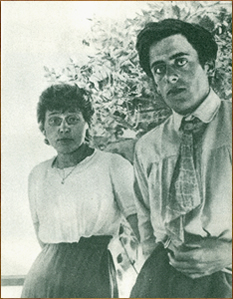
Sergei Efron (8 oktober 1893 – 16 oktober 1941)
Marina Tsvetayeva and Sergey Efron in Koktebel, 1911
De Franse schrijver en dichter André Theuriet werd geboren op 8 oktober 1833 in Marly-le-Roi. Zie ook mijn blog van 8 oktober 2010 en eveneens alle tags voor André Theuriet op dit blog.
Le Tisserand (Fragment)
Sur l'aile frémissante et le corselet bleu
Elle lance des fils gluants, et peu à peu
Elle roule la mouche en un linceul de mailles,
Et l'emporte broyée entre ses deux tenailles.
La nuit vient, dérobant victime et meurtrier.
Le tisserand pensif retourne à son métier.
Quoi ! partout la douleur à sa proie acharnée,
Et la vie à la mort à jamais enchaînée!
Partout lutte et travail... L'insecte à peine né
A cette loi terrible obéit, résigné;
Et les grands lis tout fiers de leurs blanches corolles,
Les lis immaculés, s'ils trouvaient des paroles,
Qui sait ce qu'ils diraient de leurs efforts sans fin
Pour germer, pour jaillir de l'oignon souterrain,
Et pousser droit leur tige et fleurir à l'air libre?...
Il relève la tète, il sent dans chaque fibre
De ses muscles lassés la vigueur revenir.
Courage! le pain manque et le jour va finir;
Courage!... Et vous, leviers, sous le pied qui vous guide,
Montez et descendez. Toi, navette rapide,
Fais ton devoir. — Les fils se croisent mille fois,
L'étoffe s'épaissit sur le rouleau de bois,
Et longtemps, dans la nuit calme, on entend encore
Du métier haletant le bruit sec et sonore.
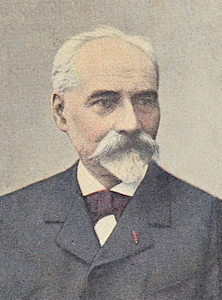
André Theuriet (8 oktober 1833 – 23 april 1907)
In de jaren 1870
De Duitse dichter en schrijver Nikolaus Becker werd geboren op 8 oktober 1809 in Bonn. Zie ook mijn blog van 8 oktober 2010 en eveneens alle tags voor Nikolaus Becker op dit blog.
Abschied und Wiedersehen
II.
Es ist die Schlacht geschlagen -
Wie öd' des Kampfes Plan!
Es schaut mit blassem Glanze
Der Mond die Leichen an.
Und blutig liegt ein Jüngling
An eines Hügels Rand;
Des feindes stolzes Banner
Hält fest die strarre Hand.
Und eine Maid daneben,
Die trägt ein tiefes Weh;
Gebrochen ist das Auge,
Die Wange bleich, wie Schnee.
Mit ihren langen Locken
Neigt sie sich trüb hinab -
So senkt die Trauerweide
Sich nieder auf ein Grab.
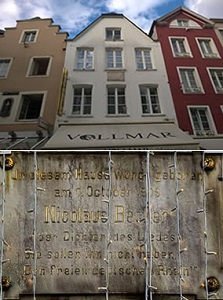
Nikolaus Becker (8 oktober 1809 – 28 augustus 1845)
Beckers geboortehuis in de Sternstraße in Bonn met gedenkplaat tussen de ramen boven
Onafhankelijk van geboortedata
De Amerikaanse schrijver Atticus Lish werd geboren in 1972 in New York. Zie ook alle tags voor Atticus Lish op dit blog.
Uit: Preparation For The Next Life
The man with the bandana had come over to them.
You got the prettiest girl at the bar.
Thanks.
She’s the best one here. Believe that.
Skinner clicked bottles with him. The man leaned to Zou Lei and touched bottles with her.
I told him you’re the prettiest girl at the bar.
She raised her beer and he raised his.
God bless you both, the man said. Beneath his bandana, he had an earnest face, and, although he couldn’t have been over the age of twenty-five, fat on his chest and stomach. She could see that he did not do many pushups.
For half a minute, all of them directed their attention to the TV, where the match had ended and people other than the athletes were milling in the ring. Shortly, the earnest man eased back and stood with his friend.
The Spanish music was loud enough to swim in.
Zou Lei pointed to her ear.
What? He’s crazy?
No, the music!
She imitated the cowbell. It sounds like the animal is coming! And she imitated the feet of an animal with her hands.
Don’t remind me!
You shoot this animal!
I didn’t. It wasn’t me, I swear!
He threw his arm around her shoulder, squeezing her to him briefly and letting her go before she could object. A minute later, he reached up behind her and tugged a lock of her wavy hair.
In the center of the floor, a man in a black cowboy hat was dancing with a woman who looked as if she had given birth to many sons and daughters and they would all be drunks together forever. She was in her fifties perhaps, and wore a very short black skirt. In her high heels, she was taller than her partner, whose shoulder she rested her hand on. When she moved, you could see the thicker section of her nylons.”

Atticus Lish (New York, 1972)
|



